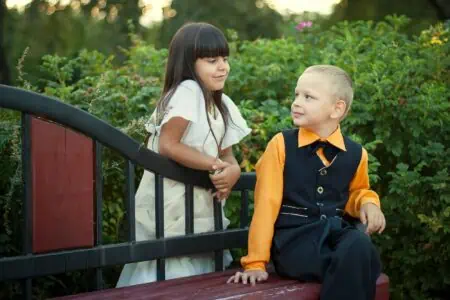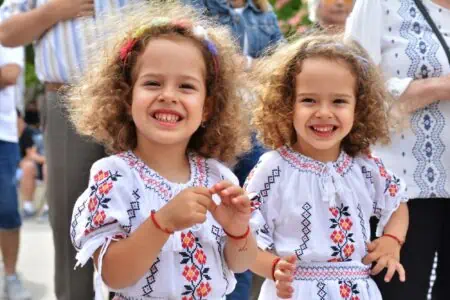Few other surname categories are as varied as last names that start with V. They appear in languages like Italian and Spanish and extend to Dutch and Slavic naming traditions, among others. How can you ensure you don’t miss out when getting to the bottom of this assortment of unique surnames?
Don’t lose hope; you’ll find all you need to know about surnames starting with H ahead. Our concise yet informative guide is packed with meanings and origins of 250 last names starting with V. You’ll be an expert in V surnames before you can say “victory!”
90 Traditional Last Names Starting With V
These surnames, starting with V, are among the most classic V names.
- Vaccarelli – the Italian plural variant of Vacarello, from “vaccaro,” meaning “cowherd.”
- Vaccaro – the Italian occupational name for a cowherd, originating from the Latin “vacca,” meaning “cow.”
- Vacek – one of multiple Czech patronymic surnames, which means “son of Václav.”
- Vachon – a French occupational name for a cowherb based on “vache,” meaning “cow.”
- Vaclavik – a Czech and Slovak name derived from Vaclav, the Czech form of Wenceslas.
- Vadas – a Hungarian nickname for an “unsophisticated person,” from “vad,” meaning “wild.”
- Văduva – a mainly Hungarian surname, meaning “widow” in Latin and Romanian.
- Valdez – means “son of Baldo” in Spanish, a short form of Baltazar; also means “from the valley.”
- Vale – a 4-letter example of geographic last names that start with V, meaning “in the valley.”
- Valencia – a surname and girl’s name taken from the Latin Valentia, meaning “valor.”
- Valente – a Galician and Portuguese nickname that means “brave” and “valiant.”
- Valentine – is from the Roman family Valentinus and the Latin “valens,” meaning “strong and healthy.”
- Valentinov – the Russian form of Valentine, which also means “son of Valentin.”
- Valerio – originated from the Latin Valerius, based on “valere,” meaning “to be strong.”
- Valjak – a Croatian surname appearing in the Zlatar region, that also indicates a “square” or “plaza.”
- Valjean – created by Victor Hugo for Les Misérables; from the French “voilá Jean,” meaning “here’s Jean.”
- Van – means “pattern” in Chinese Indonesia; also a nickname from the English Vance, meaning “marshland.”
- Van Alphen – a Dutch toponymic surname given to those from places called Alphen throughout The Netherlands.
- Van Andel – one of many Dutch topographical last names starting with V, meaning “from Andel” in Brabant.
- Van Buren – given to someone “of or from Buren” in the Netherlands and also means “neighbors.”
- Vanchev – a Bulgarian patronymic surname beginning with V, meaning “son of Vancho.”
- Van Damme – means “from Damme” in Belgium, from the Dutch “dam,” denoting a “dike.”
- Van der Beek – for those from Terbeek or Beek in the Netherlands; from “beke,” meaning “stream” or “creek.”
- Van der Ven – ranked 37th among Dutch V last names in 2007; means “from the fen or peatlands.”
- Van Dijk – also appears as Van Dyke in Dutch; means “from the dike,” meaning “dam.”
- Vanev – a unique Bulgarian last name given to a “son of Ivan.”
- Vang – denotes various farmsteads in Norwegian and Danish, meaning “field meadow” in Swedish.
- Vanhal – another form of the Dutch Van Hal, referring to various place names in the Netherlands.
- Van Horn – for those from Dutch towns called Horn or Hoorn; means “promontory where the dike bends.”
- Van Houten – means “from Houten,” the name of a Dutch town, from “houten,” meaning “wood.”
- Vankleef – is made up of “van,” meaning “of,” and “kleef,” meaning “clay.”
- Vankov – another form of the Bulgarian Vanev, meaning “son of Ivan.”
- Van Leeuwen – given to someone from various place names in Belgium and describes a “burial mound.”
- Vannes – relates to the Veneti, Celts living in pre-Roman southwestern Gaul, meaning “from Nes” in Dutch.
- Varela – a Spanish-Galician place name and a diminutive of “vara,” meaning “rod” or “stick.”
- Vargas – a Spanish and Portuguese topographical surname; from “varga,” meaning “hatched hut” or “steep slope.”
- Vartanian – a patronymic Armenian surname based on Vartan, which also means “shield” in Persian.
- Vasilev – means “son of Vasil,” a Bulgarian form of the Greek Basileos, or Basil.
- Vasquez – taken from the medieval Spanish Velasco, meaning “crow” in Basque.
- Vass – from the Hungarian “vas,” meaning “iron,” as given to an ironworker or smith.
- Vasylenko – a Ukrainian and Belarusian patronymic surname meaning “son of Vasyl,” a form of Basil.
- Vaughn – from the Welsh “bychan,” meaning “small,” and is popular among surnames starting with V.
- Vedrić – a 6-letter Croatian surname with an unknown meaning, mostly appearing in the Zadar region.
- Vega – means “knowledge” or “wisdom” in Sanskrit and is used by practitioners of Hinduism.
- Velasco – derived from the Basque “belasko,” meaning “small valley” or “ravine.”
- Velez – inspired by the medieval Vela, from Vigila, a place dating back to the Visigoths.
- Velić – comes from the Bosnian “velija,” which means “guardian” in Turkish.
- Ventimiglia – originated as Albintimilium and Vintimilium in Latin and relates to “venti miglia,” meaning “twenty miles.”
- Ventura – a short form of Bonaventura, meaning “good fortune” in Spanish and Italian.
- Verity – a nickname taken from the Old French “verité,” meaning “truth” and “righteousness.”
- Ververs – a 7-letter occupational Dutch surname based on “verver,” meaning “dyer” and “painter.”
- Vespa – an Italian nickname meaning “wasp” that’s better known as an Italian motor scooter.
- Vest – a German variation of Fest and a nickname for a “strong, steadfast person.”
- Vestberg – a Scandinavian surname based on “vest,” meaning “west” and “berg,” meaning “mountain.”
- Vickers – an English occupational name for someone serving as a vicar or priest.
- Vico – an Italian short form of Lodovico, meaning “famous warrior” as a beautiful form of Louis.
- Vidal – originally appeared as the Latin surname Vitalis, meaning “life” and “vitality.”
- Vidović – means “son of Vid” in Serbo-Croatian, based on Vid, the Slavic form of Vitus.
- Vie – based on the French “vivre,” meaning “to live” or “to be alive.”
- Vieira – a Portuguese and Galician word denoting the great pilgrim mussel, also known as a “scallop.”
- Vieth – a German-Swiss surname based on the German “vite,” meaning “dearly beloved.”
- Vigil – dates back to the Latin “vigilia,” meaning “wakefulness,” also means “descendant of Vigil.”
- Vilar – from the Latin “villare,” referring to “(part of an) outlying farm” or “dependent settlement.”
- Villa – means “village” in Latin and is given to someone living in the center of a village.
- Villanueva – is composed of the Spanish “village settlement” and “nueva,” the feminine form of “new.”
- Villareal – one of many Spanish geographical last names that start with V, meaning “royal farmstead.”
- Villari – relates to the Latin “villarius,” which describes a “dweller in the settlement.”
- Villegas – a Spanish surname given to those “from Villegas” in the Burgos province.
- Vince – a short form of the boy’s first name, Vincent, referring to a “conqueror.”
- Vincent – also a personal name based on the Latin Vincentius, from “vincere,” meaning “to conquer.”
- Vinogradov – a common Russian surname based on “vinograd,” meaning “grape” and “vinogradnik,” meaning “vineyard.”
- Vitali – an Italian form of Vitalis, meaning “life-giving” and “vital,” a nickname for Vitalianus.
- Vives – from the Catalan first name Vives, a medieval phrase meaning “may you live.”
- Vivian – an English and French feminine first name taken from the Latin Vivianus, meaning “living.”
- Vlašić – a Serbo-Croatian surname based on “Vlah,” named after speakers of a medieval Slavic language.
- Võ – a variation of a Chinese surname meaning “together” and “harmonious,” used in Macau.
- Vogt – a German occupational name for a “farm manager,” from the Middle German “voget.”
- Voight – an American spelling of the German Voigt and Vogt, meaning “bailiff.”
- Vold – a Norwegian variant of Voll, deriving from the Old Norse “vǫllr,” meaning “grassy field meadow.”
- Volden – one of multiple Norwegian last names starting with V, from “voll,” meaning “meadow.”
- Volk – means “people” in German but means “wolf” in many Slavic languages.
- Volkov – a masculine Russian surname from “volk,” meaning “wolf.”
- Voll – a German alternative to Volk named after over 50 Norwegian farmsteads.
- Volpe – an Italian nickname for a “fox,” also given to a cunning person or a redhead.
- Vonnegut – composed of the German “vonn(e),” meaning “by” and “gut,” meaning “good.”
- Vörös – means “red” in Hungarian; a nickname for someone with red hair or a reddish complexion.
- Voss – based on the German “vōs,” meaning “fox” and a nickname for a “clever” person.
- Vroom – from the Middle Dutch, “vrōme,” meaning “firm,” and “upright,” also means “benefit” or “use.”
- Vuka – is the Slavic feminine form of the Russian “vuk,” meaning “wolf.”
- Vuković – a patronymic Serbo-Croatian surname that means “son of Vuk” or “son of the wolf.”
80 Unusual Last Names That Start With V
Uncover some of the more unique last names starting with V, that remain distinct.
- Vaaden – a Dutch spelling relating to the Swedish Vadén, meaning “near a fjord.”
- Vadakke – originated in the Indian-Malayalam language, meaning “northern home on the stone.”
- Vaddeman – possibly linked to the Swedish Vardeman, referring to a “beacon man.”
- Vadhera – is the name given to Hindus who also believe in the Sikh religion.
- Vadivelu – an Indian warrior god also called Lord Murugan, whose sword is called a “vadivel.”
- Vadlamani – its meaning is unknown, but it’s associated with Indian Hindus practicing as a Brahman.
- Vadnais – a French alternative to Vadenay, named after a town in Marne, France.
- Vadney – an American spelling of the French Vadnais, a unique geographical name.
- Vagh – means “tiger” in India and is considered a Hindi name.
- Vaghela – an Indian-Gujarot surname, inspired by the Hindu goddess Vyaghreshvari.
- Vaidya – means “scholar” or “physician,” based on the Sanskrit “vid,” meaning “to know.”
- Vaidyan – based on the Sanskrit “vaid,” meaning “doctor” or “physician,” primarily used in South India.
- Vaitheeswaran – derives from the Indian “vaidya,” meaning “doctor,” and “ishvara,” meaning “god,” the deity of healing.
- Valdivia – a Spanish geographical surname based on “val(le),” meaning “valley.”
- Vallejo – the name of towns in Burgos León and Cantabria in Spain known for their “valleys.”
- Valois – a term given to those from Le Valois, France.
- Valverde – a Spanish and Portuguese place name referring to a “green valley.”
- Vanalstyne – from the Flemish Van Alstein, named after a town in Belgium or the Netherlands.
- Vanantwerp – originally the Dutch and Flemish Van Antwerpen, given to someone from Antwerp, Belgium.
- Vance – taken from the Old English “fenn,” meaning “marshland,” also used as a boy’s name.
- Vandegrift – comes from the Middle Dutch “grifte,” which describes a “man-made channel.”
- Vandenheuval – given to someone living on or near a “heuvel” or “mound.”
- Vandervoort – a Dutch topographical name for someone living near a ford or crossing point.
- Vandeventer – used for someone “from Deventer,” in Overijssel, Netherlands; also common in South Africa.
- Vandewater – means “from the water” in Dutch and also appears as Van de Waeter.
- Vandiver – means “from Theiver,” Amsterdam, and goes back to the 16th-century.
- Van Dyke – an Americanized spelling of the Dutch Van Dijck, meaning “living near the dike.”
- Vanegas – a spelling alternative to the Spanish Banegas, a Jewish patronymic name meaning “son of Egas.”
- Vanhook – an Americanized version of the Dutch Van Hoek for those from Hoek.
- Vanloon – a traditional Dutch surname for those from Loon, in North Brabant and Drenthe.
- Vannorman – originally Van Norman, made up of the Dutch “van,” meaning “from,” and “normann,” meaning “Northman.”
- Vansickle – linked to the Flemish Van der Sickel, from “sickel,” denoting the sign of a “sickle.”
- Vanwinkle – an Anglo form of the Dutch Van Winkel, meaning “from the shop.”
- Vanzile – an Americanized variant of Van Zijl for someone living near a “zijl,” meaning “pump.”
- Varghese – a short form of the first name Geevarghese, an Indian verion of George.
- Varley – originally appeared as the Irish Mac an Bhearlaigh, meaning “descendent of the sharp-eyed man.”
- Vasav – originated in the Indian-Gujarat language, one of the titles for the Hindu god Lord Indra.
- Vasta – an Italian variation of Basta, meaning “that’s enough” when referring to the number of children.
- Vaubel – derives from the Old German “vaw,” meaning “to bend or curve.”
- Vaziri – an Iranian surname based on “vazīr,” a title given to a state official or minister.
- Vejar – a Spanish variation of Béjar that refers to Véjer in Cádiz, Spain.
- Veloz – derives from the medieval first name Velasco, a Spanish nickname for a “fast” person.
- Venditti – an Italian plural version of Venditto, taken from the male given name Benedetto.
- Venezia – one of many Italian surnames starting with V given to someone “from Venice.”
- Verduzco – an 8-letter Spanish surname taken from “verdusco,” meaning “dark green.”
- Vernon – comes from the Latin “vern,” referring to an “alder tree;” it also means “springlike” and “flourishing.”
- Vessel – an Anglo variant of the Slovenian and Slovak Vesel, meaning “merry” or “cheerful.”
- Vetter – a German nickname for a “paternal uncle’s nephew,” from the Old German “fater,” meaning “father.”
- Vickrey – an occupational name for the cleric taken from “vicari(e),” meaning “substitute.”
- Vig – means “happy” and “cheerful” and is used as a nickname for a happy-go-lucky person.
- Villagomez – given to someone “from Villagómez la Nueva” in Spain; also refers to “Gomez’s villa.”
- Villalba – a place name in Spain, composed of “villa,” meaning “farmstead” and “alba,” meaning “white.”
- Villalobos – means “town of wolves” in Spanish and is also used in Italy.
- Villaseñor – a place name specific to Galicia Lugo province, meaning “town of gentlemen.”
- Villatoro – is composed of the Spanish “villa,” meaning “farmstead,” and “gotorum,” meaning “of the Goths.”
- Villavazo – one of multiple Spanish last names that start with V based on “villa,” meaning “townstead.”
- Vines – an English form of the Spanish Viñes relating to the Old French “vigne,” meaning “vineyard.”
- Vineyard – given to someone who lived or worked near a vineyard, from the Old English “wīngeard.”
- Vining – originally appeared as the Old English Finning, based on the male name Finn.
- Vinson – an alternative patronymic variation of Vincent, given to a “son of Vincent.”
- Vipond – a French surname for those “from Vieuxpont” in Calvados, France.
- Virma – a variation on the Indian Verma, taken from the Sanskrit “varman,” meaning “armor protection.”
- Virtanen – originally appeared as Wirtanen, meaning “river” in Finnish, from “verta,” meaning “stream.”
- Virtue – means “strength” and is also known for virtue names like Hope and Charity.
- Visser – a 5-letter Dutch occupational name given to a “fisherman,” from “visscher.”
- Vital – dates back to the Latin Vitalis and is a nickname for someone “full of vitality.”
- Vizcarra – originated in Guernica, Spain based on “bikarra,” meaning “the shoulder (of a mountain).”
- Vlahos – an ethnic name once used for an Aromanian; a nickname for a “highlander.”
- Vlahović – a patronymic Serbo-Croatian surname, meaning “son of Vlah,” an ethnic name for a Romanian.
- Voclain – taken from the Old French first name Vauquelin, meaning “foreigner,” “Celt,” or “Roman.”
- Vogelsang – given to those from Vogelsang in Germany; a Jewish surname meaning “bird song.”
- Vohra – from the Sanskrit “vyūha,” meaning “battle array,” an Indian occupational name for a merchant.
- Volkova – the feminine form of a Russian surname based on “volk,” meaning “wolf.”
- Voltolini – an Italian topographic surname for those residing in Valtellina, in Lombardy, Italy.
- Voorhees – made up of the Dutch “voor,” meaning “before,” and “hees,” meaning “wooded land.”
- Voyles – a Welsh alternative to Voyle, based on the nickname “moel,” meaning “bald.”
- Vrabel – means “sparrow” in Czech and Slovak and appears in Polish as Wróbel.
- Vũ – means “wizard,” “shaman,” or “witch” in Chinese; it also appears as Wu.
- Vue – a 3-letter Vietnamese surname named after the Vu clan of the Hmong people in China.
- Vuong – means “king” or “monarch” in Vietnamese; used by Vietnamese residents in Chinese.
80 Hard To Find Surnames Starting With V
The rarest of last names that start with V are some of the most interesting choices.
- Vafin – the male form of the given name Vaguine, from “vaga,” meaning “lazy person.”
- Vaganova – taken from the Armenian name Vagan, meaning “shield” and “omnipresent.”
- Vagner – a Slavic occupational name for a “carter” or “cartwright” and a variation of Wagner.
- Vago – a Hungarian occupational name given to a “stonecutter” or “butcher,” from “vágni,” meaning “to cut.”
- Vaida – a Lithuanian variation of the Hungarian Vajda, meaning “leader,” relating to Vaidginta.
- Valcourt – a French surname for someone from a small valley, from “val court,” meaning “short valley.”
- Valera – a town in Galicia, Spain; a diminutive of the Spanish “vara,” meaning “rod” or “stick.”
- Valiathan – originated in the Kerala state of India, and its meaning is unknown.
- Vallee – given to someone living in a valley in France or La Vallée town.
- Vallone – refers to a “deep valley” in Italian and is based on “valle,” meaning “valley.”
- Vallurupa – is also a Hindi boy’s name, but its meaning is unclear in India.
- Valtierra – the name of several places in Spain, located in Navarre and Burgos.
- Valuev – famous for an 1863 Russian decree called the Valuev Circular; also appears as Valuyev.
- Van Aalsburg – means “from Aalsburg,” in the Netherlands; from “adelsberg,” meaning “noble fortress.”
- Vanarsdale – a Flemish name originating in Belgium that means “Aart’s valley.”
- Vanderlinden – denoting those from Terlinden in the Netherlands; from the Middle Dutch “linde,” meaning “lime tree.”
- Van der Zee – means “from the sea” in Dutch and is most common in Friesland.
- Vanek – a Czech diminutive of Václav or Veceslav, meaning “greater glory.”
- Vanepps – an American spelling of the Dutch Van Epps for someone from Epse in the Netherlands.
- Vangorder – also appears as the Dutch Van Garden, for someone “from Garderen” in Gelderland.
- Vangundy – a geographical name given to someone “from Gunten,” in Switzerland.
- Vanina – means “brings good news” in Spanish and Portuguese, where it’s also a girl’s name.
- Vannatta – means “vanity” or “pride” in Italian; an altered version of the Dutch Van Natta.
- Vannote – from the Dutch Van der Not, for those from Ter Noot in French Flanders.
- Vanorden – a Dutch surname for those from Orden in the Netherlands; also appears as Van Norden.
- Vanpatten – one of many patronymic Dutch last names starting with V which means “son of Pater.”
- Vanvliet – for someone “who lived by a brook,” based on the Dutch “vliet,” meaning “stream.”
- Vanwie – an Americanized spelling of the Dutch topographical name Van Wijhe.
- Vanwyk – originally the Dutch Van Wijk, given to those “from Wijk,” meaning “district” or “settlement.”
- Vaquero – a Spanish occupational name for a cattle herder, from the Spanish “vaca,” meaning “cow.”
- Varfolomeev – represents the Russian form of Bartholomew, from the Aramaic “bar-Talmay,” meaning “son of Talmay.”
- Varnum – a regional English form of Farnham, given to those living on a “fern-covered homestead.”
- Vashchenko – inspired by the Greek “basileios,” meaning “royal,” when given to those of noble birth.
- Vasilevsky – also appears as Vasilyevsky, based on the first name Vasily, the Russian form of Basil.
- Vasina – an alternative form of the German Wasser, meaning “water” and “river.”
- Vassallo – means “vassal” in Italian, an occasional name for a nobleman serving a king.
- Vasser – relates to the French surname Vaisse, from “vaise,” meaning “miniature.”
- Vavilin – a Russian surname also used as an Italian girl’s name meaning “alive” or “lively.”
- Vdovichenko – a Ukrainian surname that means “long,” and a nickname for a tall person.
- Vdovin – a form of the Russian “vdova,” referring to a “widow.”
- Veach – a Norman-Scottish occupational surname for a cowherd, from the Latin “vacca,” meaning “cow.”
- Veber – an antiquated Slavic occupational name used for a weaver.
- Vedder – comes from the Middle Dutch “vedder,” referring to a “paternal uncle or cousin.”
- Veenstra – derived from the Dutch “veen,” meaning “marsh,” for someone living near a bog.
- Veilleux – an occupational name for a watchman, based on the Old French “veille,” meaning “watch guard.”
- Veltri – based on the Italian male name Veltro, meaning “greyhound,” from the Latin “veltrus.”
- Verdi – the Italian plural form of Verdi, from the Latin “viridis,” meaning “spring.”
- Veres – a Hungarian nickname for someone with red hair, from “vörös,” meaning “red.”
- Vesalius – linked to the Renaissance anatomist Andreas Vesalius, whose surname is thought to mean “weasel.”
- Vesey – means “from Vassy” in Normandy, France, from the Gaelic Ó’Fíodhshe, meaning “descendent of Fiach.”
- Vesper – a German nickname referring to the 6 o’clock evening prayers in Catholicism.
- Vetrov – made up of the Russian “veter,” meaning “wind,” and the suffix “-ov(a).”
- Viars – the oldest of French surnames starting with V, from the Old French “vier” meaning “greenwood.”
- Viator – means “voyager” or “traveler” in Latin and relates to the Spanish Vilaltoro.
- Vidaurri – a Spanish variation of the Basque Bidaurre, meaning “near (or facing) the road.”
- Vigue – a French occupational name for a “judicial officer,” from the Old French “viguir.”
- Villagrana – a Mexican feminine form of the Spanish Villagrán, meaning “large settlement.”
- Villasana – for those from Villasana de Mena in Spain, means “healthy farmstead” or “settlement.”
- Viloria – the name of several towns in Lugo, Galicia, and León, Spain.
- Vinton – the name of many English towns called Winton, meaning “wine town” or “wine farm.”
- Violante – also a Spanish and Italian girl’s name based on “viola,” meaning “violet.”
- Violette – means “violet” or “purple flower” as the French form of Violet or Violetta for girls.
- Virk – an Indian Sikh name inspired by the founder of a Jat clan called Virak.
- Visconti – an Italian title taken from the medieval Latin “vicecomes,” meaning “deputy of a count.”
- Vivar – based on Spanish place names like Vivar del Cid, the birthplace of the Castillian El Cid.
- Vizcaino – given to someone “from Biscay” and an occupational name for a seafarer.
- Vlasov – taken from the Russian male given name Vlas; also from “vlas,” meaning “hair.”
- Voisin – from the Old French “voisin,” meaning “neighbor,” as the nickname for a “good neighbor.”
- Voloshin – a Ukrainian and Jewish ethnic name given to someone “from Wallachia.”
- Voltaire – the invented pen name of the French writer, means “determined little thing” or “the young.”
- Vorobey – a Slavic surname meaning “sparrow” used in Ukraine; also appears as Vorobei and Vorobej.
- Voron – the Russian word for a “raven,” associated with Voronov, meaning “son of the raven.”
- Voronov – a Russian patronymic form of Voron, which means “son of the raven.”
- Vosburgh – also appears as Vosburg and Vosburgh, which all mean “fox.”
- Voskanyan – an Armenian patronymic surname given to the “son of a goldsmith.”
- Vostrikov – one of many Russian patronymic surnames whose direct meaning is unknown.
- Vovk – means “wolf” in Ukrainian origin and is also used in Belarus, Slovenia, and Croatia.
- Vrai – means “true” based on the Old French “verai” and the Latin “vērus,” meaning “real.”
- Vrooman – an alternative version of the Dutch “vroom,” a nickname for a “pious or brave person.”
- Vysotskaya – the Russian feminine form of Vysotsky, a high-status surname; relates to “vysokiy,” meaning “tall.”






